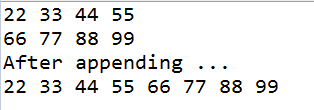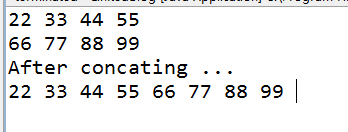【DataStructure】Some useful methods about linkedList(二)
Method 1: Add one list into the other list.
For example, if list1is {22, 33, 44, 55} and list2 is {66, 77, 88, 99},then append(list1, list2)will change list1to {22, 33, 44, 55, 44, 66, 77, 88, 99}.
static void append(Node list1, Node list2) {
if (list1 == null) {
throw new IllegalArgumentException();
}
while (list1.next != null) {
list1 = list1.next;
}
list1.next = list2;
}
The output is as follows:

Method2: Gets a new list combined by two list
For example, if list1 is {22, 33, 44, 55} and list2 is {66, 77, 88, 99}, then concat(list1, list2)will return the new list {22, 33, 44, 55, 44, 55, 66, 77, 88}.
Note that the three lists should be completely independent of each other. Changing one list should have no effect upon the others.
static Node concat(Node list1, Node list2) {
Node list3 = new Node(0);
Node p = list1;
Node q = list3;
while(p != null)
{
q.next = new Node(p.data);
p = p.next;
q = q.next;
}
p = list2;
while(p != null)
{
q.next = new Node(p.data);
q = q.next;
p = p.next;
}
return list3.next;
}
The output is as follows:

Method 3 : Replace the value of element number i with x
void set(Node list, int i, int x)
For example, if list is {22, 33, 44, 55, 66, 77, 88, 99}, then set(list, 2, 50) will change List to {22, 33, 50, 55, 66, 44, 88, 99}
Solution 1:
static void set(Node list, int i, int x) {
Node p = list;
int count = 0;
while (p != null) {
if (count == i) {
p.data = x;
break;
}
p = p.next;
count++;
}
}
Solution2:
static void set(Node list, int i, int x) {
if (i < 0) {
throw new IllegalArgumentException();
}
for (int j = 0; j < i; j++) {
if (list == null) {
throw new IllegalStateException();
}
list = list.next;
}
list.data = x;
}
The output is as follows:
